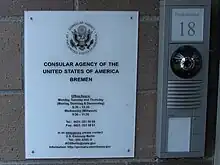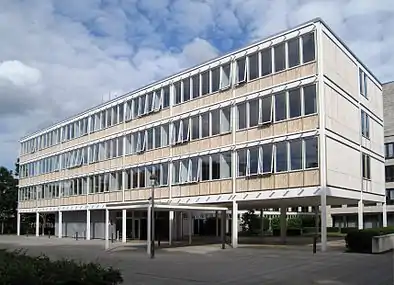| Consular Agency Bremen | |
|---|---|
 | |
| Location | Bremen, Germany |
| Address | Flughafenallee 18, 4th Floor |
| Coordinates | 53°03′19″N 8°47′01″E / 53.055205°N 8.783617°E |
| Website | de |
The Consular Agency of the United States in Bremen, also referred to as Consular Agency Bremen, was one of the American diplomatic missions to Germany until 2018. The unit offered limited services for U.S. citizens in areas including Bremen, Hamburg, Schleswig-Holstein, and Lower Saxony.[1] Despite that, services such as the issuing of visas or emergency passports were not provided, but can be obtained only from the U.S. Embassy in Berlin, the Consulate General in Frankfurt or Munich.[2]
History
Consular relations between Bremen and the United States can be traced back far before the agency's establishment. In 1794, a Consulate, later Consulate General, was established in Bremen under the order of U.S. President George Washington, and the original charter bore his signature. Arnold Delius was appointed consul.[3][4][5] It was one of the earliest-opened American missions on the European continent.[6]
Henry Boernstein was appointed consul in Bremen in 1861, the same year as the start of the American Civil War. Boernstein reported receiving a friendly reception from the Bremen government, but stated:
The rich merchant class of Bremen was, however, less favorable to our Union, and I found among them a strong inclination toward the South and its efforts at succession. This was an entirely natural result of the fact that Bremen did almost all of its business with the southern states.[7]: 355
In 1862, U.S. Senator Charles Sumner reported on the duties of the consul in Bremen, stating:
A large number of American vessels are constantly arriving in Bremen, requiring the immediate attention not only of the consul himself but one or two clerks, and since the establishment of a line of steamers between New York and Bremen the consular duties have been largely increased by the number of American travellers arriving and departing.[8]: 91, 92
In 1862, U.S. Representative Henry Winter Davis reported that Isaac R. Diller, who had served as consul from 1857 to 1861, had incurred expenses "for fuel, lights, clerk-hire, travel, and for the relief of destitute American citizens and seamen".[9]: Ixxxix
Post-World War II

The six main consular offices in Germany—Berlin (consulate general), Bremen (consulate), Frankfurt (consulate), Hamburg (consulate general), Munich (consulate general), and Stuttgart (consulate)—reopened in the spring of 1946.[13] New consulate buildings were built in the cities that had them after the war using a "common architectural language" with modernist designs. The Bremen consulate, planned by Skidmore, Owings & Merrill, was the first of these to be completed and was opened by 1955.[14]
Martin J. Hillenbrand, who served as consul from 1946–50,[15] described how the Joint Chiefs of Staff Directive 1067 stipulated that post-war Germany was "a defeated enemy nation" which was to be industrially disarmed and demilitarized, and that a program of restitution and reparations was to be enforced. Fraternization with German citizens and officials was also discouraged.[16] Hillenbrand wrote:
Reality quickly caught up with abstract formulations of policy. Nonfraternization could not stand up long in the face of the human propensity for sympathy and affection. Moreover, the plight of the civil population in the midst of destroyed buildings, food and fuel shortage, and economic collapse so obviously called for help that further punishment seemed irrelevant in what had become a battle for survival...the emphasis inevitably shifted to the provision of minimal supplies to avoid mass starvation.[16]: 50
Hillenbrand described living well as part of the "occupation establishment", and stated that the consulate had "its own club staffed by expert German cooks and waiters who were glad to be so near good food".[16]: 52 The consular car fleet included a Maybach limousine alleged to have been previously used by a senior Nazi official.[16]
During the 1960s, American buildings in West Germany became locations for anti-Vietnam War rallies, and in 1967, tomatoes and eggs were thrown at the Bremen consulate.[17] In 1986, the Consulate General was closed.[18]
In 2000, American consular presence in Bremen become the Consular Agency,[18] and a Consular Agent acts as the head of mission.[2] At first the office sat on the location of Bremen World Trade Center, then in 2011 it moved into its present address at Flughafenallee 18, right inside the Bremen Airport.[19]
The consular agency was temporarily closed in September 2017; this closure was rendered permanent on December 31, 2018.[20]
See also
References
- ↑ "U.S. Citizen Services in Germany". United States Diplomatic Mission to Germany. Archived from the original on 2015-03-25. Retrieved 2015-03-28.
- 1 2 "Consular Agency Bremen". United States Diplomatic Mission to Germany. Archived from the original on 2015-04-02. Retrieved 2015-03-28.
- ↑ Mildred Smith (1950), US Consulates Come Back (PDF), Consulate General of the United States, Frankfurt, retrieved 2015-03-24
- ↑ "Related Assignments". The Early American Foreign Service Database (EAFSD). Retrieved 2015-03-28.
- ↑ "A guide to the United States' history of recognition, diplomatic, and consular relations, by country, since 1776: Hanseatic Republics". Office of the Historian, U.S. Department of State. Retrieved 2015-03-28.
- ↑ "History". Bremen United States Center. Archived from the original on 2015-02-05. Retrieved 2015-03-28.
- ↑ Bornstein, Heinrich (1997). Memoirs of a Nobody: The Missouri Years of an Austrian Radical, 1849-1866. Missouri History Museum. p. 355. ISBN 9781883982201.
- ↑ The Reports of the Committees of the Senate of the United States for the Second Session of the Thirty-Seventh Congress, 1861'-62. U.S. Government Printing Office. 1862. pp. 91, 91.
- ↑ Reports of Committees of the House of Representatives, Made During the First Session Thirty-Eighth Congress, 1863'-64. U.S. Government Printing Office. 1864. pp. Ixxxix.
- ↑ "Public Works: Harry Bertoia for the Public". Harry Bertoia. Archived from the original on 2015-03-10.
- ↑ "Amerikanisches Konsulat (Heute BLG Logistics)" (in German). Architekturführer Bremen.
- ↑ "SOM Awards". Skidmore, Owings & Merrill.
- ↑ "Department of State. U.S. Consular Agency, Bremen, Germany. (1969? - )". The U.S. National Archives and Records Administration.
- ↑ Loeffler, Jane C. (2011). The architecture of diplomacy : building America's embassies (2nd ed.). New York: Princeton Architectural. pp. 8, 87–88. ISBN 978-1-56898-984-6. OCLC 700033660.
- ↑ "Martin Joseph Hillenbrand". Athens Banner-Herald. February 20, 2005.
- 1 2 3 4 Hillenbrand, Martin Joseph (1998). Fragments of Our Time: Memoirs of a Diplomat. University of Georgia Press. pp. 50, 52, 53. ISBN 9780820320168.
- ↑ Klimke, Martin (2011). The Other Alliance: Student Protest in West Germany and the United States in the Global Sixties. Princeton University. p. 189. ISBN 978-0691152462.
- 1 2 "The German-American Partnership: Bremen and the United States of America" (PDF). Consulate General of the United States, Hamburg. November 2011. p. 8. Retrieved 2015-03-28.
- ↑ "U. S. Consular Agency in Bremen nach Umzug neu am Flughafen Bremen eröffnet" (in German). Bremen Airport. 2011-07-25. Retrieved 2015-03-28.
- ↑ "U.S. Consular Agency Bremen". U.S. Embassy & Consulates in Germany. 3 April 2018. Retrieved 2021-07-18.
External links
- Official website Archived 2021-05-26 at the Wayback Machine